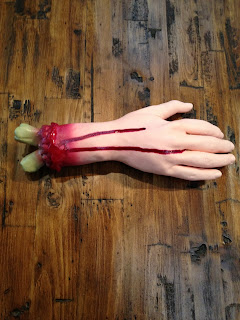I tried something new in my advocacy class this past semester. I walked into the courtroom, where my class was waiting for me. Before
saying a word, with my class in the jury box, I handed to each of them a bloody
body part, or an x-ray of a body part. (see attached samples).
Then I left.
After
a minute or so, I came back and gave them the following scenario:
Charlie
"The Rose" and Josh "The Karton" are accused of trafficking
in body parts. They allegedly kill their victims and then sever the body parts.
Then they package them and sell them. The FBI executed a search warrant at the
apartments the Rose and Karton share and recovered body parts, x-rays and a
packaged hand. The government's theory as to the x-rays is that the men studied
them to learn where to cut the body parts.
The
students then began moving exhibits into evidence.
When
each of them had successfully done so, we moved to the next hypothetical, which
was as follows:
The
number one singles player on the Stanford Tennis Team has been killed. You
represent the Number Two Tennis player, who has been accused of the murder,
largely on the theory that he stood to gain from the murder and that he and the
Number One hated each other. Number One had received a number of tennis balls
with threats, such as "Die", written on them. Your investigator
learned that another rival of Number one, named Lou Fasulo, was acting
suspiciously after the murder, and conducted an investigation. The investigator
gained entry to Fasulo's apartment and recovered 12 tennis balls, matching
those earlier threatening balls (see attached). The students each moved a
recovered tennis ball into evidence.
Then
we played Ninja, as a tribute to, and in practice of, Kartonism. For those of you unfamiliar with the Ninja exercise, it takes place in a group. The students stand in a circle. One student stands with her hands above her head, waiting to be "executed" by two ninjas on either side of her. Using imaginary swords, the Ninjas yell "Hai!" and slice the victim. The victim's last act, while dying, is to point to another student in the class while yelling something such as "Unhhh!" The student to whom the dying victim points then becomes the next victim, with the two students on either side of her now serving as Ninja executioners.
Then the students did a direct examination of me, using my Linkedin profile as a guide. I embellished my credentials (significantly-it actually felt good to say I had been the valedictorian of my law school class, and that I had been All-American in three sports), to give them fodder for cross (which will come next class).
Then the students did a direct examination of me, using my Linkedin profile as a guide. I embellished my credentials (significantly-it actually felt good to say I had been the valedictorian of my law school class, and that I had been All-American in three sports), to give them fodder for cross (which will come next class).
We will be doing the storyboarding this semester (thanks for the mention in the blog, Charlie), and I think I am going to teach them mind-mapping as a vehicle for speaking without notes. I have been using mind-mapping for years, and I think I will finally teach my students.
Of course they will be telling stories in the present tense, and will play "Zip. Zap. Zop". This is another game I learned from Josh. It helps students learn to properly project their voices. Students stand in a circle. The first student says "Zip!" while bringing the right hand forward in a handshake position and, with that hand, pointing to another student in the circle. The second student "catches" the Zip and then says "Zap" while bringing the right hand down as if slapping a table and, with that hand, pointing to another student in the circle. The third student catches the Zap and says "Zop" while bringing the right hand up, palm flat, and with that hand, pointing to another student in the circle. That student catches the Zop and starts the whole cycle over again with Zip. The game increases in pace, always in the order of Zip Zap Zop. If a student makes a mistake, everyone goes to the middle to the "fire of wisdom" and collects wisdom in their arms, rolling it towards them, while walking back to the circle and saying, "Ahhh." Eventually, student are directed to substitute another initial consonant for the words, then the other students have to follow in turn. So it might go, Kip Kap Kop, then Sip Sap Sop, and so forth. The game is a lot of fun for the students. The last variation is to switch from the right to the left hand for the motions.
To Charlie Rose and Josh Karton: Thank you for opening doors to new techniques and for
teaching the teachers!
--Robert Altchiler
--Robert Altchiler





No comments:
Post a Comment